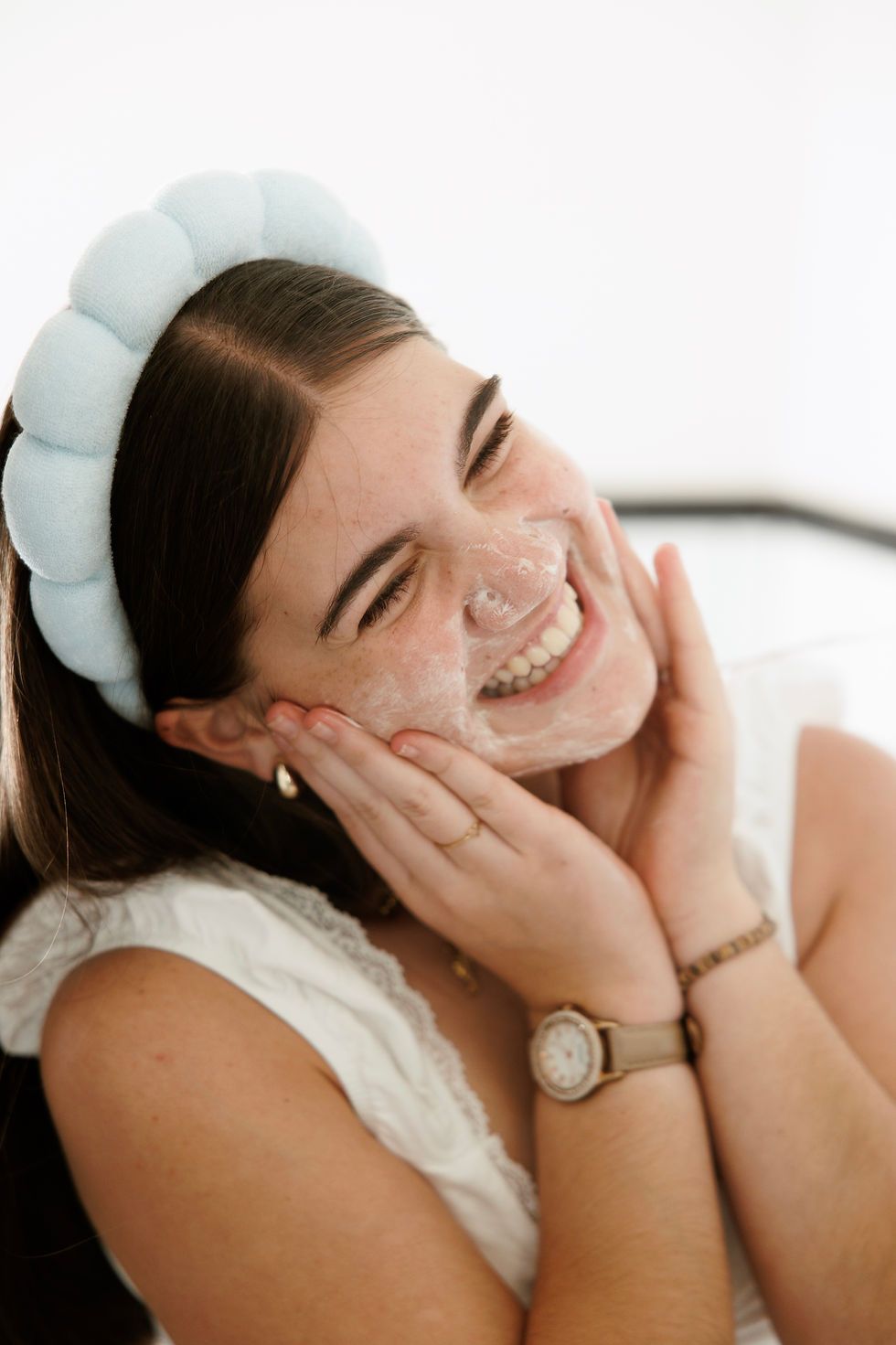What causes teen acne - hormones or hygiene?
- Natasha Venter

- Jul 14, 2025
- 3 min read
Updated: Aug 28, 2025

Acne can seem like an uninvited guest, particularly when it appears right as you're ready to enjoy life to the fullest! Acne vulgaris (caused by Cutibacterium acnes) affects up to 80% of teens and even hangs around for some adults [1]. While those red bumps and blemishes might be the first thing you notice, the real impact often hits in how we feel about ourselves. Let’s break down how acne and confidence connect, and share some practical tips grounded in science to help both teens and parents tackle it together.
1. Feeling the heat: Acne’s emotional toll
Pimples are not just skin deep. Acne may lead to feelings of embarrassment, wanting to skip social events, or even having trouble focusing on school or work. A survey done in 2011 (n = 1006) on adults and teens found that most people with acne feel embarrassed, and more than half said dealing with breakouts was the hardest part of puberty [2]. Many also said acne makes them feel less confident, with some finding it tough to make friends, date, do well in school, or even get a job.
2. Mirror, mirror: How acne shapes self-esteem
Looking in the mirror and not recognizing the person staring back can dent self-esteem. Research shows teens with acne often have lower body esteem and worry more about how others see them compared to peers without acne [3]. That increased self-consciousness can stick around, turning a bad skin day into a bad confidence day.
3. The stress-acne feedback loop
Stress and acne are teammates in the worst possible way. When you are stressed, your body kicks into gear and ramps up oil production, which can worsen breakouts [4]. More pimples can lead to more stress, and round it goes.
4. Patience pays off. Consistency is key.
Here’s the thing: most acne treatments take weeks (sometimes months) to show real changes. Scars might fade slowly, too. Knowing this up front helps set expectations and keeps disappointment at bay when results aren’t instant. Follow a trusted, easy-to-follow skincare routine, like the UPENYA 3-1 cleanse-moisturise-treat plan, to help you stick to a routine for lasting results.
5. Seek medical advice if blemishes or acne persist
If blemishes or acne persist despite a well-structured routine, it’s important to consult a medically trained professional (e.g., a dermatologist) for medical-grade assessment and support.
6 .Take back control
Learn the facts: Understand that acne involves hormones, bacteria, and genes. It takes the blame off you [3].
Celebrate small wins: Keep to your skincare routine consistent for a week straight or keep a stress journal. Celebrate each step you conquer.
Mindful moments: Simple meditation or jotting down your emotions and thoughts can lower stress and interrupt negative spirals.
7. Your support squad: family and friends
Talking openly about acne helps — turn stigma into solidarity. Parents and friends can listen without judgment, share progress highs and lows, and cheer on every small victory.
8. Celebrate you
You are more than your skin. Explore hobbies, sports, arts, or volunteering. Focus on your talents and passions, it builds self-worth beyond any pimple.
9. Craft a kind online world
Social media can be a minefield of perfect faces & filters. Follow accounts that promote real skin positivity, and mute or unfollow those that push unrealistic beauty standards. Your feed should lift you up, not bring you down.
References:
Dréno, B., Pécastaings, S., Corvec, S., Veraldi, S., Khammari, A. and Roques, C. (2018), Cutibacterium acnes (Propionibacterium acnes) and acne vulgaris: a brief look at the latest updates. J Eur Acad Dermatol Venereol, 32: 5-14. https://doi.org/10.1111/jdv.15043.
Ritvo, E., Del Rosso, J.Q., Stillman, M.A. et al. Psychosocial judgements and perceptions of adolescents with acne vulgaris: A blinded, controlled comparison of adult and peer evaluations. BioPsychoSocial Med 5, 11 (2011). https://doi.org/10.1186/1751-0759-5-11
Smithard A., Glazebrook C. & Williams H.C., 2001. Acne prevalence, knowledge about acne and psychological morbidity in mid-adolescence: a community-based study. British Journal of Dermatology, 145, pp.274–279. https://doi.org/10.1046/j.1365-2133.2001.04346.x
Gupta M.A., Gupta A.K. & Schork N.J., 1996. Psychological factors affecting self-excoriative behavior in women with mild-to-moderate facial Acne Vulgaris. Psychosomatics, 37, pp.127–130. https://doi.org/10.1016/S0033-3182(96)71578-5




Comments